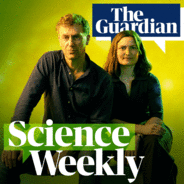The pioneering IVF procedure known as mitochondrial donation therapy (MDT) could prevent children from being born with devastating mitochondrial diseases. Madeleine Finlay speaks to Prof Darren Griffin, an expert in genetic diseases and reproduction, about how MDT works, the ethical considerations attached, and what techniques like it could mean for the future of reproduction. Help support our independent journalism at theguardian.com/sciencepod

Wissenschaft & Technik
Science Weekly Folgen
Twice a week, the Guardian brings you the latest science and environment news
Folgen von Science Weekly
300 Folgen
-
Folge vom 11.05.2023First UK baby born with DNA from three people: what happens next?
-
Folge vom 09.05.2023Will psychedelic drugs transform mental health treatment?Psychedelic drugs have long been been used for their mind-altering effects. Now, they are making their way into western medicine as a treatment for mental health disorders. From July, psychiatrists in Australia will be able to prescribe MDMA for post-traumatic stress disorder, making it the first country in the world to recognise psychedelics as medicines. The US could soon follow, with plans for the US Food and Drug Administration to be asked for approval to treat PTSD with MDMA this year. Ian Sample speaks to correspondent Hannah Devlin about how the science behind psychedelic therapy has progressed, and hears from Prof Celia Morgan about what treatment is actually like, what we know about the risks and what’s left to learn. Help support our independent journalism at theguardian.com/sciencepod
-
Folge vom 04.05.2023How AI is making non-invasive mind reading a realityFor the first time, researchers have found a way to non-invasively translate a person’s thoughts into text. Using fMRI scans and an AI-based decoder trained on a precursor to ChatGPT, the system can reconstruct brain activity to interpret the gist of a story someone is listening to, watching or even just imagining telling. Ian Sample speaks to one of the team behind the breakthrough, the neuroscientist Dr Alex Huth, to find out how it works, where they hope to use it, and whether our mental privacy could soon be at risk. Help support our independent journalism at theguardian.com/sciencepod
-
Folge vom 02.05.2023Can cities help us fight climate change?As the planet warms, and intense heatwaves become the norm, our urban environments need a radical rethink to keep them habitable. So what do we want the cities of the future to look like? In the first of our special series of episodes looking at what a future world could look like, Madeleine Finlay speaks to author and historian Ben Wilson, Prof Jessica Davies and Prof Diane Jones Allen about how to create cities that are fairer, greener and more self-reliant.. Help support our independent journalism at theguardian.com/sciencepod
